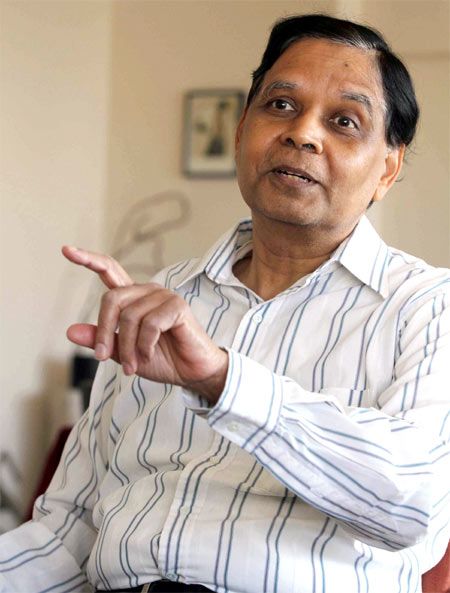 | « Back to article | Print this article |
 If people can lobby me for making changes in policies that goes against the country’s interest, I won’t keep myself in this position, says the vice chairman of NITI Aayog.
If people can lobby me for making changes in policies that goes against the country’s interest, I won’t keep myself in this position, says the vice chairman of NITI Aayog.
NITI Aayog, the government’s policy analysis and formulation arm, has come under some criticism on recent stands it has taken, with some alleging a bias on corporate interests.
Arvind Panagariya, the vice chairman, defends himself to Sanjeeb Mukherjee and Indivjal Dhasmana.
In recent weeks, NITI Aayog’s stand on delinking the list of essential medicines from the Drug Price Control Order and on endorsing locally grown and genetically modified (GM) crops is being interpreted in some quarters as favouring of corporates.
We are a professional institution and I will do nothing that goes against the national interest. What we do here is always determined by the national interest.
If people can lobby me for making changes in policies that goes against the country’s interest, I won’t keep myself in this position.
What exactly have you said in your three-year action agenda on delinking of drug price control from the list of essential medicines?
What we have said is to make sure that having a drug in the essential medicines list should not automatically lead to its price control.
If the price of the product is reasonable, there might not be a need for imposing a control. Otherwise, if the price ceiling is too low, there is a possibility that quality medicines might disappear.
Your stand on GM crops?
To allow our local guys. We have explicitly excluded the multinational companies from our recommendations on GM crops.
So, you endorse the recent clearance to GM mustard by the Genetic Engineering Approval Committee (GEAC), as it has been developed by an Indian scientist and not a multinational. However, critics are saying it is derived from a process that is invented abroad.
Do the Indian Patent Office and patent laws consider GM mustard a locally made product? If yes, there should no questions on whether the strain has been sourced from any foreign company, country or not.
If India’s patent office recognises Dr Pental’s discovery as his own, then it is his discovery without question. Otherwise, to me, this battle is purely on ideological grounds.
On taxing of agriculture, you had clarified that this was not a suggestion made by the Aayog. But, it is true that people do use the agricultural income tax window to evade tax on non-farm income. How do you wish to tackle that?
In today’s age of information technology, there are ways through which every return by non-farmers that report agricultural income could be cross-checked and verified.
A task force has been set up under you to remove discrepancies in employment data. Will it suggest wider data than those relating to eight industries, released by the Labour Bureau?
We will look at the entire issue of how to measure employment and unemployment. We will be looking not only at existing sources like the National Sample Survey but also other data sources such as EPFO (the provident fund entity).
We have to go in with a completely open mind, explore the sources available, what data sources can be useful, what are not and if these should be continued or not continued.
We are talking to scholars and economists to get their views and finding out how the US does its employment surveys, whether its approach will be applicable to us or not.
What will be the frequency of data to gauge employment or unemployment?
The statistics ministry has been laying the foundation of a survey that will generate quarterly and annual estimates. That is an ongoing exercise. My view is we should have a quarterly assessment of employment.
On non-performing assets (NPAs) with banks, does the recent ordinance meet your suggestion in the three-year action agenda, where you suggest auctioning of assets?
I now feel very optimistic that we would make good progress in clearing NPAs over the next six to eight months. There is recognition on the part of public sector banks (PSBs) that the government is behind this, there is provision for oversight committees, etc, all very good.
NITI Aayog has suggested the government gradually withdraw from activities that serve no public purpose and can be undertaken by the private sector. Does Air India fall in this bracket?
In principle, yes. In how many years you tackle that remains to be seen. The approach we have taken is to go for low-hanging fruit. For PSBs, it is trickier, as they have a public purpose to their operations.
NITI Aayog’s three-year action agenda has pegged compensation to be paid to states for the loss due to GST (the coming goods and services tax) at Rs 37,500 crore for 2017-18. Some say it won’t be less than Rs 50,000 crore.
This is anybody’s guess. In any case, the two amounts are not so different. Also, we were doing a purely indicative exercise and our purpose was to analyse how in three years we can substantially reallocate expenditure towards sectors that need greater attention, without cutting the basic expenditure like salaries.